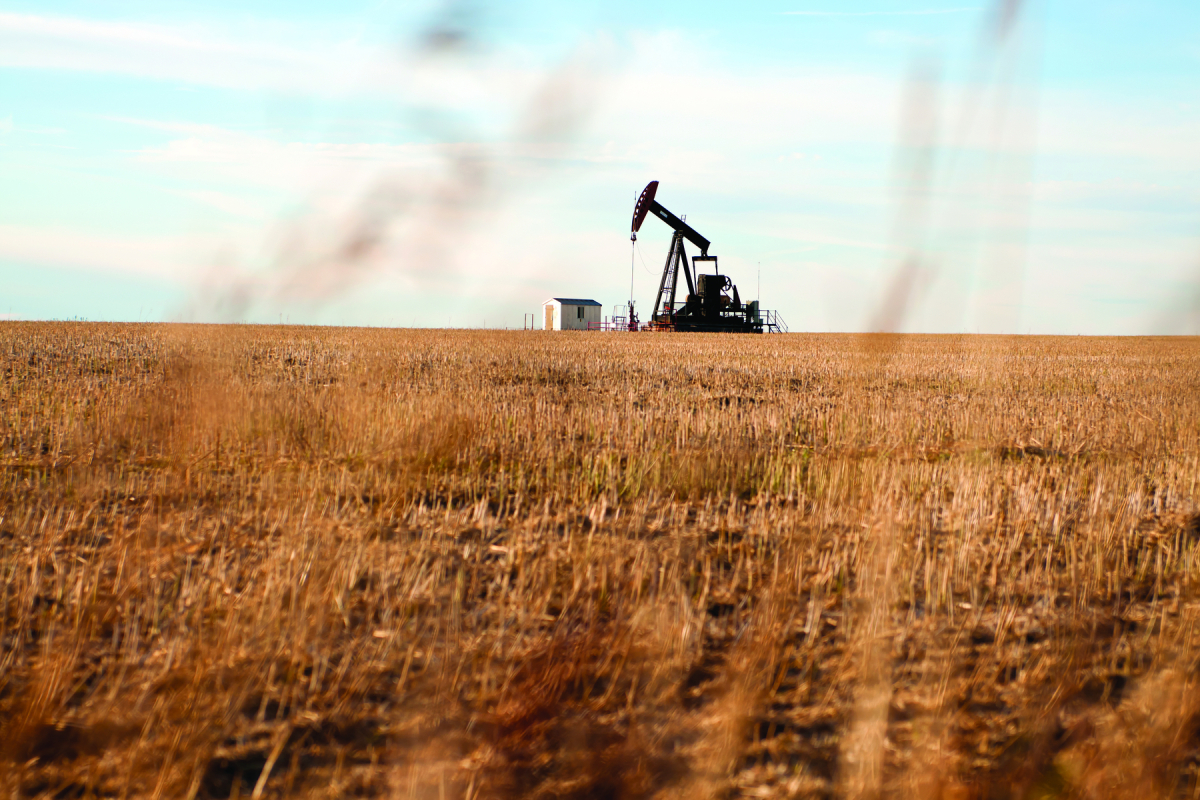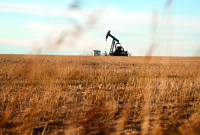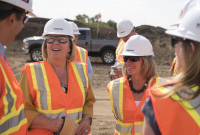A well left behind by a bankrupt oil and gas company is standing in the way of Dwight Popowich’s retirement plan.
The well is currently sitting idle on Popowich’s property about an hour-and-a-half drive east of Edmonton, which he had planned to sell to fund his retirement. But so-called "orphan wells," which have no financially-viable owner, can leak, presenting an environmental risk that has proved a tough sell.
“We got screwed,” Popowich said in a phone interview. “Who wants to deal with a well that’s in limbo because the regulator hasn’t done a good job?”
Meanwhile, regulators in California have successfully compelled Exxon Mobil, which sold a batch of offshore orphan wells to a company that later went bankrupt, to help the state plug and clean up the site. Though the state’s approach to orphan wells has been deeply flawed in the past, it’s now taking strident steps to address them, an approach Popowich said Alberta could learn from.
"There’s no political will to fix it (in Alberta)," Popwich said. “It’s just, keep kicking the can down the road and let it stumble along.
In most North American jurisdictions, the owner of an oil or gas well that is done producing is responsible for plugging it, decommissioning it and returning the land to its original state. Wells become orphaned when their owners go bankrupt and shut down, leaving the cleanup costs at risk of falling to taxpayers.
To minimize this risk, many states and provinces compel oil and gas companies to pay a security deposit up-front — often referred to as a security bond — that is set aside for cleanup.
In California, the amount set aside has turned out to be nowhere near enough, prompting calls for urgent action. The state hasn’t properly tracked the issue and the amount of up-front security deposits it has collected is US$500 million short of the estimated cleanup bill. Even the Exxon case will leave some costs to the state.
But California’s problem pales in comparison to the one facing Alberta, which has more relaxed security deposit requirements and has declined to go after previous well owners.
The province’s orphan wells could cost a staggering $8 billion to clean up, the C.D. Howe Institute found in 2017, when Alberta had fewer orphan wells than it does today. The province currently holds a fraction of that, about $200 million, in security bonds, for all wells, orphan and not.
"California has the guts to go after these companies," said Lucija Muehlenbachs, an economist at the University of Calgary who studies oil and gas liabilities.
"I don’t know if Alberta has the same guts to do that."
The Alberta government has promised to unveil new rules around well management early this year but has given no indication what the new requirements could include. The office of Alberta Energy Minister Sonya Savage didn’t respond to a request for comment.

‘We’ve been really let down here in rural Alberta’
The well on Popowich’s land was left behind thanks to a loophole in Alberta’s laws. Its original owner, Perpetual Energy, transferred the aging site and its cleanup bill for virtually nothing to Sequoia Resources, a new company that never had the funds to cover the liability.
Sequoia went bankrupt in March 2018 and walked away from its 3,200 wells, raising questions about how the Alberta Energy Regulator (AER) had allowed this deal, and numerous similar deals, to happen in the first place. The site on Popowich’s property has been sitting idle ever since.
Orphan wells aren’t actually orphans at all, Popowich said — authorities are well aware of who drilled them and passed off their environmental responsibility; the government just choose not to pursue them.
“How can we tell the world we are environmentally and ethically responsible in developing our energy when this is happening in our backyard?” he said.
In Alberta, the industry-funded Orphan Well Association (OWA) is tasked with cleaning up sites with no viable owner. But that organization is struggling with a large backlog, and has also relied on $30 million in grants and a $235-million loan from the provincial government.
The OWA currently has custody of 3,406 wells that need to be decommissioned and 2,772 decommissioned sites in need of environmental reclamation, numbers that are all but certain to grow as more companies go bankrupt. Sequoia’s wells, for example, haven’t yet been transferred to the OWA but threaten to nearly double its existing total.
Meanwhile, many struggling companies have stopped paying their leases to landowners and halted municipal tax payments. The unpaid taxes now amount to $173 million.
"We've been really let down here in rural Alberta," Popowich said.
Alberta’s auditor general is now investigating the province’s handling of the situation.
Including both orphan wells and those with viable owners, there are about 450,000 wells total in the province, according to an estimate from the C.D. Howe Institute. Eventually, the costs of cleaning up every single one of them could reach $100 billion, according to internal regulatory documents obtained by National Observer, Global News and the Toronto Star in 2018. (In a similar worst-case scenario, cleanup of California’s 229,000 wells could cost US$8 billion, or C$10.5 billion). Publicly, the Alberta government has said the cleanup would cost $30 billion.
Some of Alberta’s wells could still be on the landscape after 2,800 years, National Observer and the Star reported last year.

You can check out anytime you want, but the wells have got to leave
Some 5,540 wells in California appear to be orphans, found a study produced by the California Council on Science and Technology (CCST), a non-partisan state agency. It was commissioned by the state’s oil and gas regulator and was released last week.
That number is a rough estimate, as California hasn’t historically monitored when oil and gas companies go bankrupt. Regardless, none of the wells on the list have been decommissioned.
The CCST report warns that California has only set aside a fraction of the money needed to pay to clean up the sites. “Historically, the bond requirements for oil and gas wells in the state have been relatively small compared to the scale of the cleanup costs,” Judd Boomhower, the lead author of the report and an environmental economist at the University of California at San Diego, said in a phone interview.
“For me, the takeaway was that they’re kind of in a similar situation as us,” said Muehlenbachs. “They didn’t collect enough bonds to cover the cleanup costs.”
Still, Alberta’s cleanup funds are an even smaller fraction of what it could need. Cleaning up wellsites tends to be more expensive in Canada than in the United States, Muehlenbachs said, but that still doesn’t make up for the discrepancy.
Part of the problem, she added, is the relatively-lax system Alberta uses to assess how much oil and gas producers need to pay in upfront security. It’s based on the financial viability of well operators: the regulator assesses the value of each company’s assets and compares it to the expected cleanup bill. A security deposit is only required when the cleanup costs are greater than the company’s assets.
In theory, this would ensure that riskier companies pay for the cleanup obligations before they go bankrupt, but the regulator’s calculation also overinflates asset values, according to previous work by Muehlenbachs. Under the regime, many well operators in Alberta don’t have to pay up-front at all and those who do pay relatively low amounts.
And although the province has tightened its rules around dumping wells on financially weak companies, it hasn’t pursued previous owners who engaged in such transactions to pay for cleanup costs.
In California, however, all well operators pay an up-front security deposit, not just the ones that are struggling financially. The state has pursued past well owners when those bonds don’t cover the final cost.
Both moves have led to a proportionally-smaller burden on California’s public purse.

'Let these weak players get out of the picture'
Though California and Alberta face a significant common problem, both also have the opportunity to prevent it from getting worse.
In both places, tens of thousands of wells are currently sitting idle, with experts warning that many could be at risk of becoming orphans in the future. Some inactive wells are reactivated later, but often producers leave them that way to put off the costs of cleaning up the land.
Some of the idle wells in California are almost inevitably going to be orphaned, said Boomhower. But with many of the others, "getting more financial security on those wells today while they’re economically viable could potentially prevent orphan well problems in the future, after those wells may be transferred to a different operator who's less financially healthy."
Other jurisdictions have successfully imposed mandatory deadlines for cleaning up idle wells.
Alberta’s government has generally been reluctant to do both things, as the province’s energy industry has been struggling amid a global downturn in oil prices that began in 2014.
However, California's policies also include a fresh idea for Alberta: instead of imposing deadlines, the state charges companies a fee per idle well.
"You need a way to incentivize oil and gas operators," Boomhower said.
Other case studies have shown that increased scrutiny can lead to a healthier sector. In a paper released last year, Boomhower found that tightened liability rules in Texas did drive out a few companies — but they tended to be “small and had poor environmental records,” leaving the industry that remained healthier in the long run, the study said.
“We need to let this sector consolidate, let these weak players get out of the picture,” Popowich said. If that doesn’t happen, he added, he doesn't have a lot of hope that issues with his well will be resolved before something goes wrong, safety-wise.
"There’s no emergency response plan that protects my family or my neighbours that are around this thing," he said.
"We’re going to be left holding the bag with the cleanup."






Comments
Unfortunately, compared to California, Alberta's Conservative government is pretty much owned by the petroleum industry. No way they will act to make these companies clean up their mess. The most they'll do is to use taxpayers' dollars to do the clean up, and to be able to continue to bragg about their good fiscal management, they'll reduce taxes even more for government services, health, infrastructure, education, pensions etc.
Like Trevor Cook, the UCP, like the previous PC governments are in bed with Big Oil. 8 Billion $ is a huge liability! It may double according to NO reports. When the price of oil crashed in 2015, (cause: Saudi Arabia reclaiming market share), the first thing to happen was the Provincial Govt, , oil workers, and Big Oil, calling for the Feds to spend billions on orphan well reclamation to put oil workers back to work! These are the same people who complain about federal so-called over spending and how gov't should not be involved in oil. Next we learn there is likely a larger liability from oil sands waste water pond reclamation! Then Kenney gets elected, goes after nonprofits , unions, education, medical, (us) under a pretense of we are overspending while reducing tax rates for Big Oil and the elite. Neoliberal economics has failed in the last 40 years. Why are Canadians and Albertans worried? Increasing inequality of incomes, a sense of being left behind or being left out, all directly caused by extreme neoliberalism (ultraconservatism) . Democracy falters as inequality in incomes increases as it gas in every Western Democracy. The orphan well problem is the tip of the iceberg.
absolutely agree with all your analysis
Schadenfreud makes me hope the KKKenny will be holding the bag when it all really implodes ,which it almost certainly will quite suddenly like the Berlin Wall falling.(one day all looks normal; next dY the shell crumbles todust before our eyes and into vacuum comes?)
I will be surprised if any oil company pays a cent of clean up in NO BALLS ALBERTA or the feds con or lib or maybe even NDP??? write "laws" and regulations to MAKE THEM PAY
So, why do you think many people from BC are so against the Trans mt. pipeline , which is an accident waiting to happen, the site C dam and now the LNG pipeline? All of these projects have been given huge incentives, subsidies etc. with the mantra of jobs, jobs jobs. They all have serious environmental risks which industry always ignores. When thing go wrong who do you think will clean it up or pay for the clean up? These clean up jobs are NOT the ones we want!! Our pristine coastline will never recover, the farmland in Dawson Creek will be destroyed forever and the Kitimat LNG.? .....don’t even get me started!! WAKE UP PEOPLE!! Cheerio from Salt Spring Island
And more often than not, cleanup is highly incomplete, or absent, and "restoration" ... well, isn't restoration to the original state.
It's not as though what's left behind is a mere wart on the scenery.
Unlike Alberta, California has been fortunate enough (smart enough?) to develop a highly diversified economy. Not that this economy is immune to the shocks being delivered by Climate change and the global movement of tectonic plates!
California has many existential problems - but there is some intelligence at work there and some politicians who are willing to put their careers on the line to solve or remediate these problems.
In Alberta we have politicians who for generations have catered to the quickest, fastest buck available and with rare exception, these politicians have joined the get rich quick mentality - grab the money and run, don't worry about consequences, don't consider the lands and lives you ruin with your greed.
Alberta is further plagued by its highly transient, non-resident investors, and by the get rich quick labour force that is largely transient too. Everyone knows of the evils this cut and run economy spawns - but No one aspiring to power in Alberta has the cojones to fix the crumbling applecart. Like the malignant narcissists they are, it is always the evil outsiders, federales, Bay St. Barons, greedy easterners who are the source of Alberta's woes. Self delusion will get you every time.
Bang on, Betsy. Seems an Alberta politician's idea of strategy is figuring out where to go for lunch, and tactics is the actual ordering. Little thought, and no political willpower, has been applied to long term prosperity for the people of Alberta.
Before starting a well, any company should be required to have insurance that will pay for decommissioning and restoration if the company can not do it. The insurance should have no end date and the insurance company should be reinsured so that it can not get out of paying. This would put the well on an appropriate commercial basis.
The Alberta provincial government has been 'captured' by industry players. As other commentators have pointed out. That is the huge difference between Alberta and other jurisdictions. This excellent book by past Member of Alberta's Legislative Assembly, Kevin Taft, spells it out
http://www.lorimer.ca/adults/Book/3012/Oils-Deep-State.html
Alberta sold out its citizens to the oil industry years ago, and those citizens continuously returned those who sold them out to office, time after time, and looked the other way. The motivator: greed. Now a new generation is still doing the same thing. They don't get it yet. Perhaps someday they will.